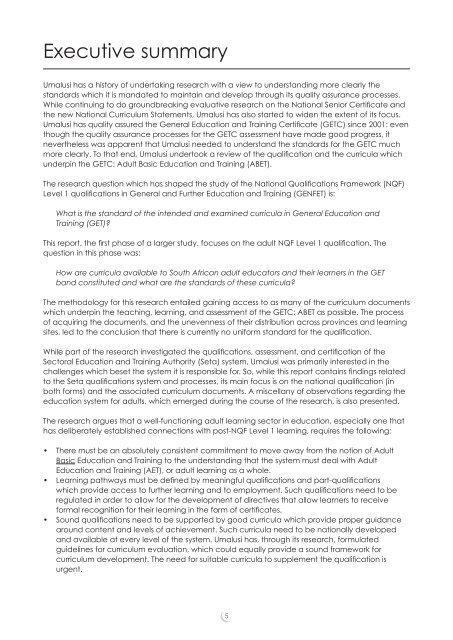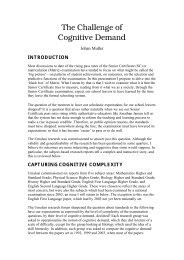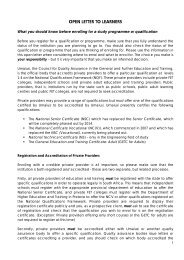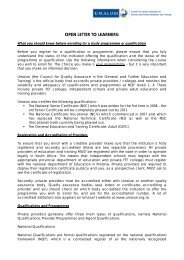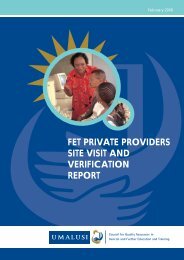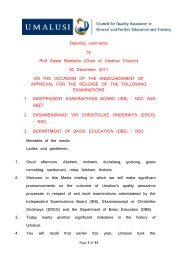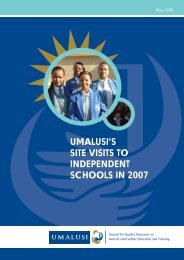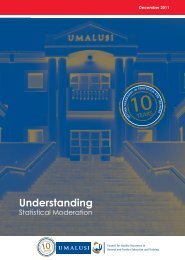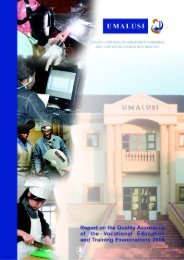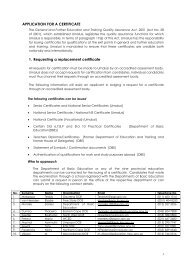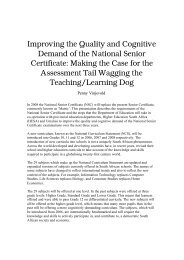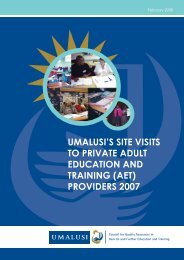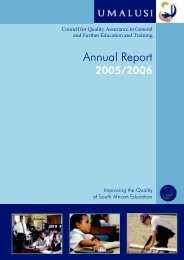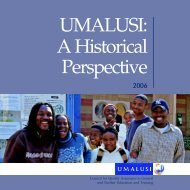Inspecting the Foundations - Umalusi
Inspecting the Foundations - Umalusi
Inspecting the Foundations - Umalusi
You also want an ePaper? Increase the reach of your titles
YUMPU automatically turns print PDFs into web optimized ePapers that Google loves.
Executive summary<strong>Umalusi</strong> has a history of undertaking research with a view to understanding more clearly <strong>the</strong>standards which it is mandated to maintain and develop through its quality assurance processes.While continuing to do groundbreaking evaluative research on <strong>the</strong> National Senior Certifi cate and<strong>the</strong> new National Curriculum Statements, <strong>Umalusi</strong> has also started to widen <strong>the</strong> extent of its focus.<strong>Umalusi</strong> has quality assured <strong>the</strong> General Education and Training Certifi cate (GETC) since 2001: eventhough <strong>the</strong> quality assurance processes for <strong>the</strong> GETC assessment have made good progress, itnever<strong>the</strong>less was apparent that <strong>Umalusi</strong> needed to understand <strong>the</strong> standards for <strong>the</strong> GETC muchmore clearly. To that end, <strong>Umalusi</strong> undertook a review of <strong>the</strong> qualifi cation and <strong>the</strong> curricula whichunderpin <strong>the</strong> GETC: Adult Basic Education and Training (ABET).The research question which has shaped <strong>the</strong> study of <strong>the</strong> National Qualifi cations Framework (NQF)Level 1 qualifi cations in General and Fur<strong>the</strong>r Education and Training (GENFET) is:What is <strong>the</strong> standard of <strong>the</strong> intended and examined curricula in General Education andTraining (GET)?This report, <strong>the</strong> fi rst phase of a larger study, focuses on <strong>the</strong> adult NQF Level 1 qualifi cation. Thequestion in this phase was:How are curricula available to South African adult educators and <strong>the</strong>ir learners in <strong>the</strong> GETband constituted and what are <strong>the</strong> standards of <strong>the</strong>se curricula?The methodology for this research entailed gaining access to as many of <strong>the</strong> curriculum documentswhich underpin <strong>the</strong> teaching, learning, and assessment of <strong>the</strong> GETC: ABET as possible. The processof acquiring <strong>the</strong> documents, and <strong>the</strong> unevenness of <strong>the</strong>ir distribution across provinces and learningsites, led to <strong>the</strong> conclusion that <strong>the</strong>re is currently no uniform standard for <strong>the</strong> qualifi cation.While part of <strong>the</strong> research investigated <strong>the</strong> qualifi cations, assessment, and certifi cation of <strong>the</strong>Sectoral Education and Training Authority (Seta) system, <strong>Umalusi</strong> was primarily interested in <strong>the</strong>challenges which beset <strong>the</strong> system it is responsible for. So, while this report contains fi ndings relatedto <strong>the</strong> Seta qualifi cations system and processes, its main focus is on <strong>the</strong> national qualifi cation (inboth forms) and <strong>the</strong> associated curriculum documents. A miscellany of observations regarding <strong>the</strong>education system for adults, which emerged during <strong>the</strong> course of <strong>the</strong> research, is also presented.The research argues that a well-functioning adult learning sector in education, especially one thathas deliberately established connections with post-NQF Level 1 learning, requires <strong>the</strong> following:• There must be an absolutely consistent commitment to move away from <strong>the</strong> notion of AdultBasic Education and Training to <strong>the</strong> understanding that <strong>the</strong> system must deal with AdultEducation and Training (AET), or adult learning as a whole.• Learning pathways must be defi ned by meaningful qualifi cations and part-qualifi cationswhich provide access to fur<strong>the</strong>r learning and to employment. Such qualifi cations need to beregulated in order to allow for <strong>the</strong> development of directives that allow learners to receiveformal recognition for <strong>the</strong>ir learning in <strong>the</strong> form of certifi cates.• Sound qualifi cations need to be supported by good curricula which provide proper guidancearound content and levels of achievement. Such curricula need to be nationally developedand available at every level of <strong>the</strong> system. <strong>Umalusi</strong> has, through its research, formulatedguidelines for curriculum evaluation, which could equally provide a sound framework forcurriculum development. The need for suitable curricula to supplement <strong>the</strong> qualifi cation isurgent.5


